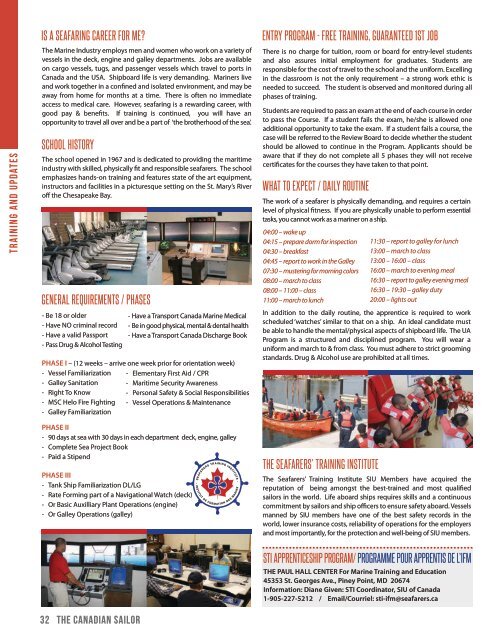Marin
5jF7nRhCU
5jF7nRhCU
You also want an ePaper? Increase the reach of your titles
YUMPU automatically turns print PDFs into web optimized ePapers that Google loves.
TRAINING AND UPDATES<br />
IS A SEAFARING CAREER FOR ME?<br />
The <strong>Marin</strong>e Industry employs men and women who work on a variety of<br />
vessels in the deck, engine and galley departments. Jobs are available<br />
on cargo vessels, tugs, and passenger vessels which travel to ports in<br />
Canada and the USA. Shipboard life is very demanding. <strong>Marin</strong>ers live<br />
and work together in a confined and isolated environment, and may be<br />
away from home for months at a time. There is often no immediate<br />
access to medical care. However, seafaring is a rewarding career, with<br />
good pay & benefits. If training is continued, you will have an<br />
opportunity to travel all over and be a part of ‘the brotherhood of the sea’.<br />
SCHOOL HISTORY<br />
The school opened in 1967 and is dedicated to providing the maritime<br />
industry with skilled, physically fit and responsible seafarers. The school<br />
emphasizes hands-on training and features state of the art equipment,<br />
instructors and facilities in a picturesque setting on the St. Mary’s River<br />
off the Chesapeake Bay.<br />
GENERAL REQUIREMENTS / PHASES<br />
- Be 18 or older<br />
- Have NO criminal record<br />
- Have a valid Passport<br />
- Pass Drug & Alcohol Testing<br />
- Have a Transport Canada <strong>Marin</strong>e Medical<br />
- Be in good physical, mental & dental health<br />
- Have a Transport Canada Discharge Book<br />
PHASE I – (12 weeks – arrive one week prior for orientation week)<br />
- Vessel Familiarization - Elementary First Aid / CPR<br />
- Galley Sanitation - Maritime Security Awareness<br />
- Right To Know<br />
- Personal Safety & Social Responsibilities<br />
- MSC Helo Fire Fighting - Vessel Operations & Maintenance<br />
- Galley Familiarization<br />
ENTRY PROGRAM - FREE TRAINING, GUARANTEED 1ST JOB<br />
There is no charge for tuition, room or board for entry-level students<br />
and also assures initial employment for graduates. Students are<br />
responsible for the cost of travel to the school and the uniform. Excelling<br />
in the classroom is not the only requirement – a strong work ethic is<br />
needed to succeed. The student is observed and monitored during all<br />
phases of training.<br />
Students are required to pass an exam at the end of each course in order<br />
to pass the Course. If a student fails the exam, he/she is allowed one<br />
additional opportunity to take the exam. If a student fails a course, the<br />
case will be referred to the Review Board to decide whether the student<br />
should be allowed to continue in the Program. Applicants should be<br />
aware that if they do not complete all 5 phases they will not receive<br />
certificates for the courses they have taken to that point.<br />
WHAT TO EXPECT / DAILY ROUTINE<br />
The work of a seafarer is physically demanding, and requires a certain<br />
level of physical fitness. If you are physically unable to perform essential<br />
tasks, you cannot work as a mariner on a ship.<br />
04:00 – wake up<br />
04:15 – prepare dorm for inspection<br />
04:30 – breakfast<br />
04:45 – report to work in the Galley<br />
07:30 – mustering for morning colors<br />
08:00 – march to class<br />
08:00 – 11:00 – class<br />
11:00 – march to lunch<br />
11:30 – report to galley for lunch<br />
13:00 – march to class<br />
13:00 – 16:00 – class<br />
16:00 – march to evening meal<br />
16:30 – report to galley evening meal<br />
16:30 – 19:30 – galley duty<br />
20:00 – lights out<br />
In addition to the daily routine, the apprentice is required to work<br />
scheduled ‘watches’ similar to that on a ship. An ideal candidate must<br />
be able to handle the mental/physical aspects of shipboard life. The UA<br />
Program is a structured and disciplined program. You will wear a<br />
uniform and march to & from class. You must adhere to strict grooming<br />
standards. Drug & Alcohol use are prohibited at all times.<br />
PHASE II<br />
- 90 days at sea with 30 days in each department deck, engine, galley<br />
- Complete Sea Project Book<br />
- Paid a Stipend<br />
PHASE III<br />
- Tank Ship Familiarization DL/LG<br />
- Rate Forming part of a Navigational Watch (deck)<br />
- Or Basic Auxilliary Plant Operations (engine)<br />
- Or Galley Operations (galley)<br />
32 THE CANADIAN SAILOR<br />
THE SEAFARERS’ TRAINING INSTITUTE<br />
The Seafarers’ Training Institute SIU Members have acquired the<br />
reputation of being amongst the best-trained and most qualified<br />
sailors in the world. Life aboard ships requires skills and a continuous<br />
commitment by sailors and ship officers to ensure safety aboard. Vessels<br />
manned by SIU members have one of the best safety records in the<br />
world, lower insurance costs, reliability of operations for the employers<br />
and most importantly, for the protection and well-being of SIU members.<br />
STI APPRENTICESHIP PROGRAM/ PROGRAMME POUR APPRENTIS DE L’IFM<br />
THE PAUL HALL CENTER For <strong>Marin</strong>e Training and Education<br />
45353 St. Georges Ave., Piney Point, MD 20674<br />
Information: Diane Given: STI Coordinator, SIU of Canada<br />
1-905-227-5212 / Email/Courriel: sti-ifm@seafarers.ca


